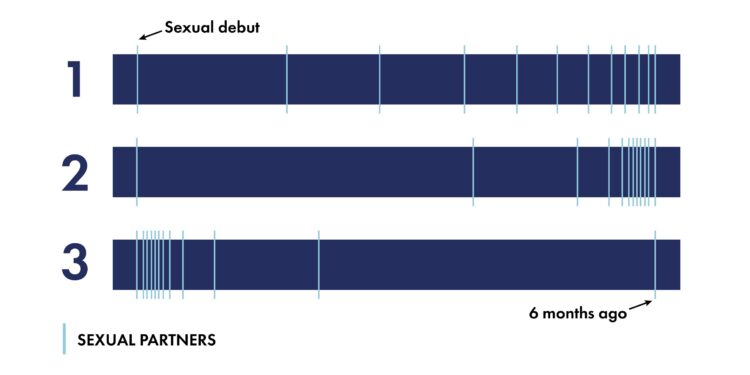The illustration shows a visual chronology shown to participants, representing the sexual history of a potential partner. Each calendar has shown the same number of previous partners (12), but with different models – some concentrates early in life, others spread uniformly and some decreasing over time. The results of the study show that people were more willing to commit to someone whose meetings had become less frequent over time, as shown in the calendar 3. Credit: Swansea University
A major international study revealed that when it comes to choosing a long -term partner, people around the world consider not only the number of sexual partners that someone had, but also when these meetings took place.
This is the first time that researchers have explored the moment of sexual history alongside quantity – offering a new perspective on the psychology of human coupling. The study is published in the journal Scientific relationships.
Directed by Swansea University, the study questioned more than 5,000 participants from 11 countries on five continents. He found that people were generally less willing to get involved in someone with a high number of previous sexual partners but were more open if these meetings had become less frequent over time, suggesting a distance from occasional sex.
The main researcher, Dr. Andrew G. Thomas of the University of Swansea psychology school, explains: “People use sexual history as an index to assess relational risk. In our ancestral past, knowledge of someone’s sexual history could help people avoid risks such as STIs, infidelity, emotional instability or rivalry with ex-partner.
“Previous studies have shown that people are generally less inclined to pursue relationships with individuals who have had many past sexual partners. However, which is particularly interesting about the conclusions of this study is that this effect decreases when these meetings have occurred mainly in the past and it is something that we have found around the world.”
Participants showed simple visual calendars representing the sexual history of a potential partner. Each calendar has shown the same number of previous partners, but with different models – some concentrates early in life, others spread uniformly and some decreasing over time. The participants then evaluated their desire to continue a committed relationship, revealing that the time of past meetings, in particular if sexual activity with new partners had slowed down over time, considerably shaped their perceptions.
The study revealed little evidence of a double sexual standard, male and female participants evaluating sexual history in a similar way. Only minor sexual differences have been observed between countries and cultures.
Dr. Thomas said: “The results of this study indicate a lack of double sexual standard, which questions the idea that women are judged more severely for their sexual past than men.”
The study also examined how people’s own attitudes towards occasional sex influenced their opinions. Those who were more open to occasional relationships were less affected by a partner’s sexual history, although they have always shown some sensitivity.
Dr. Thomas concluded: “The online speech around the sexual history of people can be very overwhelming, but the results of this study reveal that the image is much more nuanced. We have been led to believe that society deems severely those who have a sexually adventurous past, but as an individual, people are in fact much more indulgent, especially if someone’s approach has changed.
“The results of this study have not only highlighted the universal nature of our sexual psychology, but could be used to combat misogynous discussions on online sexual history.”
More information:
Andrew G. Thomas et al, sexual partner and distribution number over time affects the evaluation of long -term partners: evidence of 11 countries on 5 continents, Scientific relationships (2025). DOI: 10.1038 / S41598-025-12607-1
Supplied by Swansea University
Quote: It is not only how much, it is when: people judge the sexual history of a potential partner by timing, and not the total number (2025, August 4) recovered on August 5, 2025 from
This document is subject to copyright. In addition to any fair program for private or research purposes, no part can be reproduced without written authorization. The content is provided only for information purposes.



